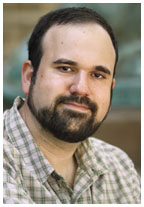
|
|
September 14, 2005: On the Campus
(Illustration by Hal Mayforth) |
The ‘post-enrolled’ blues
By Michael Frazer GS
Returning to Princeton in the fall, many grad students find that, despite all appearances to the contrary, they’re no longer actually grad students. It has long been University policy to categorize Ph.D. candidates who take longer than the four or five years allotted by their departments as “post-enrolled.” For a year, they are given the status of “DCC,” for “Degree Candidacy Continuing.” After that, an “ET” is added: “Enrollment Terminated.”
The Graduate Student Government (GSG) has long sought an end to this practice, which it terms “cruel and inhumane.” The University last month proposed allowing students to remain students for up to two years after their graduate fellowships run out if they pay discounted tuition of $3,500 and a $1,000 health plan fee previously covered by their graduate fellowships. Those who decline to pay still would have the option of going post-enrolled. Either way, when University funding is no longer available, ETs who can’t phone home for help have always made ends meet with University jobs.
As the GSG calls for study of the plan, which would take effect next year, grad students are wondering whether officially remaining a student would be worth the cash. Elliott Ratzman, an ET-DCC non-student in religion, says that post-enrollment is “causing me some discomfort, but nothing unreasonable.” No longer qualifying as a student usually means a series of minor hassles like giving up your old ID and having to sign up for borrowing privileges at the library as an alum. Student loans may come due, but Nassau Hall provides letters to lenders explaining that, while no longer officially an enrolled student, a post-enrollee is still pretty much just that. Things are tougher for international students. Architecture non-student Rupinder Singh describes being post-enrolled as “more than horrible.” The GSG reports that, over the last five years, at least 10 international ETs have been forced to return home after having their student visas revoked because they were no longer “students.”
The real question is whether mandatory post-enrollment has hindered young scholars in their quest for a Princeton doctorate. Ratzman defends the old practice, saying “the grad school is trying to exercise ‘tough love’ in order to help students finish their dissertations.” The GSG disagrees, insisting that “50 years of psychological research has demonstrated that punitive measures reinforce behavior rather than changing it.” And as grad students always do, they provide extensive footnotes to prove it.
Even while they’re still officially recognized as students, life can be tough for international Ph.D. candidates — even if they’re Canadian. Just ask Louis-Pierre “L.P.” Arguin, a grad student in mathematics from Quebec City. Like most Quebeckers, while Arguin speaks fluent English, he’s proud to call French his mother tongue.
A wide variety of resources are offered by the McGraw Center’s English Language Program (ELP) to grad students who find themselves immersed for the first time in the language of Shakespeare, Milton, and Britney Spears. Arguin decided to skip the first offering — an optional, four-day introduction to American language and culture. Next up was the mandatory Speaking Proficiency English Assessment Kit (SPEAK) Test, which Arguin assumed he would pass.
What he didn’t know was that the optional orientation he skipped included detailed instructions on how to pass the SPEAK; most importantly, students were told that SPEAKing casually or colloquially is discouraged. Thus, Arguin reports, while “a lot of people who are not fluent ended up passing the test,” he did not, and was condemned to a year of remedial English instruction.
An appeal to Associate Dean David Redman of the Graduate School was unsuccessful, Arguin says: “He argued that undergrads were complaining about preceptors’ English, so they had to be quite tough on the issue.” Indeed, an April report compiled by the Precept Review and Reform Committee of the Undergraduate Student Government noted that instructors’ poor language skills are often a classroom problem.
“The people in the ELP were extremely nice,and the teachers were
very good,” Arguin says. “They understood my situation but
could not do anything about it.” ![]()
(Photo by Frank Wojciechowski) |
Michael Frazer is a graduate student in politics. His status is DCC.

To read our exclusively online On the Campus column, click here.

